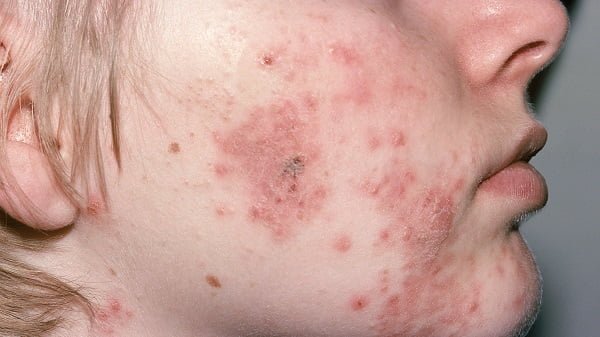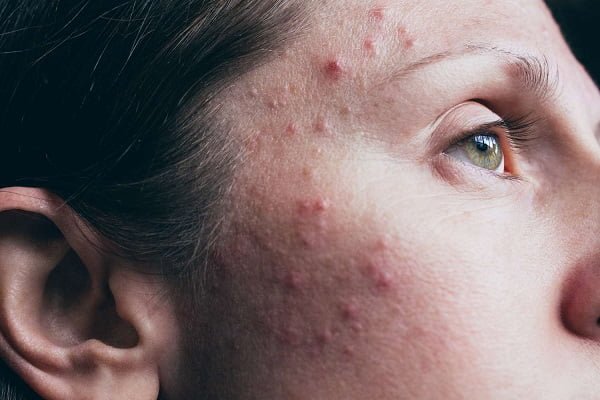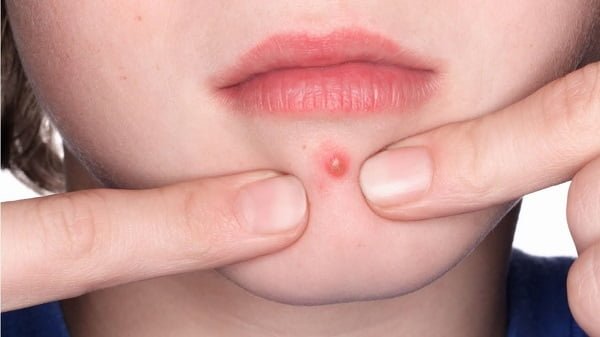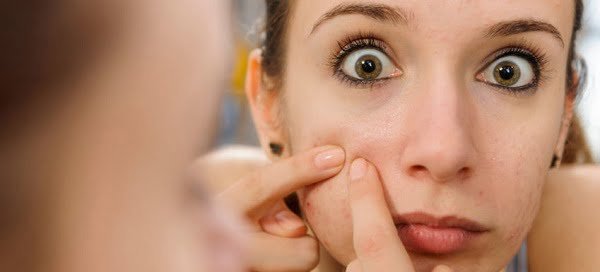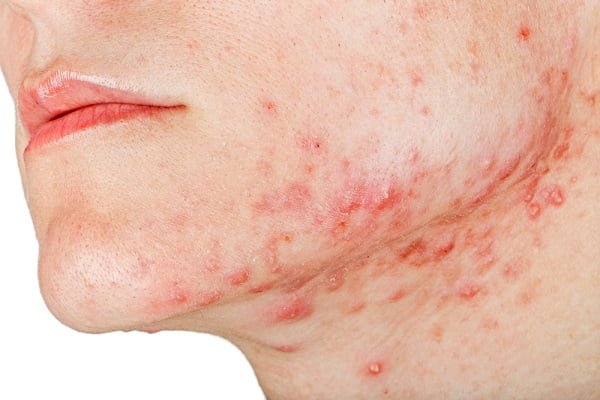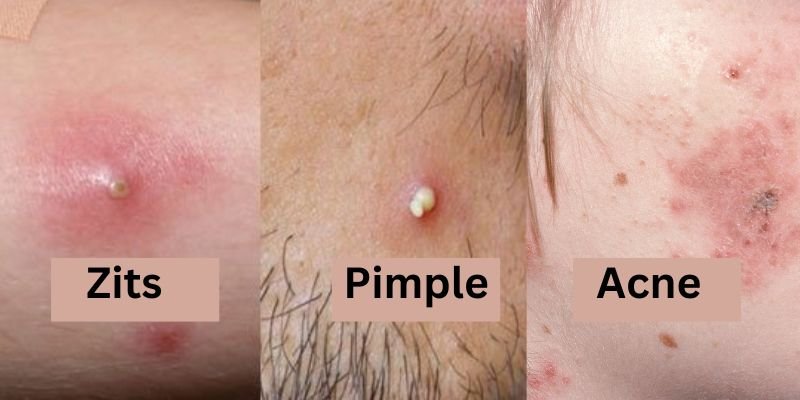Introduction
Experiencing sudden onset cystic acne can be frustrating and bewildering, especially if you’ve never dealt with severe acne before. In this comprehensive guide, we’ll explore the potential causes behind the sudden appearance of cystic acne and offer practical solutions to help you manage and treat this challenging skin condition effectively.
Cystic acne is a severe form of acne characterized by deep, painful nodules or cysts that develop beneath the skin’s surface. Unlike milder forms of acne, such as whiteheads or blackheads, which typically affect the skin’s outer layer, cystic acne involves inflammation and infection deep within the pores.
Key features of cystic acne include:
Large, Painful Lesions: Cystic acne lesions are larger and more painful than typical pimples. They often appear as red, swollen bumps beneath the skin’s surface.
Deep Inflammation: Cystic acne involves deep inflammation and infection within the hair follicles. This inflammation can lead to the formation of pus-filled cysts that may be visible on the skin’s surface.
Risk of Scarring: Due to the depth of inflammation and infection, cystic acne lesions carry a higher risk of scarring than milder forms of acne. The risk of scarring is particularly significant if the lesions are picked or squeezed.
Persistence: Cystic acne lesions tend to persist for longer periods than other types of acne. They may take weeks or even months to heal completely and often leave behind marks or scars.
Cystic acne can occur anywhere on the body, but it is most commonly found on the face, neck, chest, and back. It can affect people of all ages, but it is most prevalent during adolescence and early adulthood when hormonal fluctuations are common.
Why Am I Getting Cystic Acne All of a Sudden?
Hormonal Fluctuations: Hormonal fluctuations, particularly an increase in androgen levels, can trigger the onset of cystic acne. These hormonal shifts may occur during puberty, menstruation, pregnancy, or as a result of hormonal imbalances or medical conditions such as polycystic ovary syndrome (PCOS).
Stress and Lifestyle Factors: High levels of stress, poor sleep habits, and unhealthy lifestyle choices such as a diet high in processed foods and sugar can contribute to the sudden onset of cystic acne. Stress triggers the release of cortisol, a hormone that can stimulate oil production and inflammation in the skin, leading to acne flare-ups.
Genetics: Genetics can also play a significant role in the development of cystic acne. If you have a family history of severe acne, you may be predisposed to experiencing sudden outbreaks of cystic acne.
Skincare Products and Makeup: Using skincare products or makeup that contain comedogenic ingredients or are too heavy for your skin type can clog pores and contribute to the sudden onset of cystic acne. It’s essential to choose non-comedogenic, oil-free products specifically formulated for acne-prone skin.
Environmental Factors: Environmental factors such as pollution, humidity, and exposure to harsh chemicals or irritants can exacerbate acne symptoms, including cystic acne. Protecting your skin from environmental aggressors and maintaining a clean, healthy environment can help prevent acne flare-ups.
Managing Sudden Onset Cystic Acne: Practical Solutions
Dealing with sudden onset cystic acne requires a comprehensive approach that addresses underlying causes and incorporates effective skincare practices. Here are some practical solutions to help you manage and treat cystic acne effectively:
Adopt a Consistent Skincare Routine: Establish a daily skincare routine tailored to your skin type and concerns. Cleanse your skin gently twice daily, exfoliate regularly to remove dead skin cells, and use non-comedogenic, oil-free moisturizers and acne treatments.
Manage Stress: Practice stress-reduction techniques such as mindfulness, meditation, yoga, or deep breathing exercises to help manage stress levels and reduce cortisol production, which can exacerbate cystic acne.
Maintain a Healthy Lifestyle: Prioritize healthy lifestyle habits, including regular exercise, adequate sleep, and a balanced diet rich in fruits, vegetables, whole grains, and lean proteins. Avoid processed foods, sugary snacks, and excessive caffeine and alcohol consumption.
Seek Professional Help: If over-the-counter treatments fail to effectively manage cystic acne, consult a dermatologist for personalized treatment options. Your dermatologist may recommend prescription medications, topical treatments, or in-office procedures to help control acne and prevent scarring.
Conclusion
The sudden onset of cystic acne can be distressing, but it’s essential to remember that you’re not alone, and effective treatment options are available. By understanding the potential causes behind sudden acne outbreaks and implementing practical solutions, you can regain control of your skin health and achieve clearer, healthier skin. Don’t hesitate to reach out to a dermatologist for professional guidance and support on your journey to managing cystic acne effectively.
Faq related to "Why am I getting cystic acne all of a sudden"
Sudden onset cystic acne can occur, although it may be unexpected and distressing. While some individuals may have a history of acne, others may experience their first episode of cystic acne seemingly out of nowhere.
Sudden onset cystic acne may be triggered by hormonal fluctuations, stress, genetics, skincare products, lifestyle factors, or environmental factors. Identifying the specific cause can help in effectively managing and treating the condition.
Yes, hormonal fluctuations, such as those occurring during puberty, menstruation, pregnancy, or as a result of hormonal imbalances, can trigger the sudden onset of cystic acne. Hormonal changes can stimulate excess oil production and inflammation in the skin, leading to acne flare-ups.
High levels of stress can exacerbate cystic acne by triggering the release of cortisol, a hormone that stimulates oil production and inflammation in the skin. Managing stress through relaxation techniques and lifestyle changes may help alleviate acne symptoms.
Yes, using skincare products containing comedogenic ingredients or heavy formulations can potentially worsen cystic acne by clogging pores and exacerbating inflammation. It’s essential to choose non-comedogenic, oil-free products specifically formulated for acne-prone skin.
Unhealthy lifestyle habits such as poor diet, lack of sleep, inadequate hydration, and excessive consumption of processed foods, sugar, or dairy products may contribute to sudden onset cystic acne. Adopting a healthy lifestyle may help improve acne symptoms.
In some cases, sudden onset cystic acne may be associated with underlying medical conditions such as polycystic ovary syndrome (PCOS), hormonal imbalances, or thyroid disorders. Consulting a healthcare professional for evaluation and diagnosis is recommended.
Managing sudden onset cystic acne requires a comprehensive approach that may include establishing a consistent skincare routine, managing stress levels, adopting a healthy lifestyle, and seeking professional guidance from a dermatologist for personalized treatment options.
Sudden onset cystic acne lesions may persist for weeks or even months before resolving completely. It’s essential to be patient and consistent with skincare and treatment regimens while seeking professional help if the condition does not improve or worsens over time.

